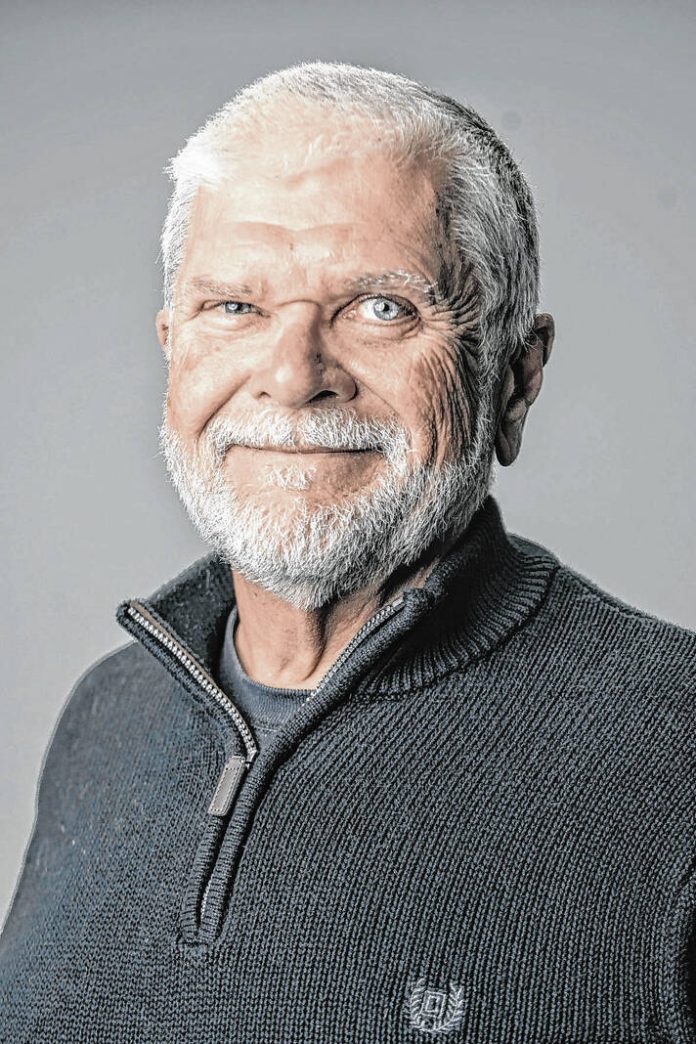Mark cupped his dry, white, wisp of a hand around the backside of the hibiscus flower and bent forward, pulling it gently toward his face – not to smell the blossom but to peer intently inside its core.
“Do you see how delicate it is?” he mused. “Lean down here and look. It’s like a tiny garden inside, with red and yellow, velvet cushions for some little person to sit on and watch the wind wiggle the angel hair and the bees gather the pollen.” I leaned down and joined him in the gazing, our heads nearly touching.
“Look at those yellow pods, balanced on the ends of translucent columns,” he whispered, as if he were afraid the flower might hear and order us to go away. “How do they stay there? It’s like magic. It is hard to believe something like this exists, right in my backyard.”
Several minutes passed as Mark whispered his tour of the secrets buried inside the flower — moist folds and quivering stamen and filaments releasing pollen into the wind. We stooped there, ear to ear, peering like botanical spelunkers into the depths of the hibiscus.
“You know, it would be wonderful if we could just climb in there and have a real, close-up look around,” he said, suddenly straightening up as if someone had just pulled the curtain on the peep show. “There is so much around us that we never really see. Sometimes we don’t see them because we can’t find a way to get close enough to them. But most of time we don’t see them because we just don’t take the time to look.”
I was a visiting hospice volunteer and I also had been around dying people in my own family, but I had heard few of the dying describe their experience quite as clearly as that.
Mark continued to talk about the wonder of the hibiscus as he shuffled around his backyard wearing only a brown, time-worn corduroy bathrobe — his sockless feet scooting back and forth in a pair of oversized slippers.
I asked him if he always had been such an observer of the world around him.
“Well, I guess I have always taken the time to look at things a bit, but more so since I was told I am about to die,” he said. “That kinda makes you focus. Moments become important because you know you don’t have many of them left. Details become important because you realize this may be the last time you see something or hear something or feel something.
“When they told me I was dying and there was no hope, I went through all the stages. You know, I cried and screamed and told them they were wrong. Then I got mad. Then I cried some more. Finally, I just calmed down. But I still don’t know if I have accepted the idea. Much of the time it doesn’t seem real now.”
“Not real?” I quizzed.
“I mean, it is not just that dying doesn’t seem real. Living in the first place doesn’t seem real. There are days when I think all of it is just an illusion; dying and living and existing seem to be the same thing and I can’t separate them enough to think about the dying by itself. Does that make any sense?”
I told Mark I didn’t know what makes sense, then added the worn-out adage that each of us just has so many days — that we don’t know how much time we have and we need to do the best we can each day.
“Yeah, well, pardon me, that crap about ‘so many days’ is an idiot’s way of escaping the whole deal,” he said. “If there is one thing I know, it is that we do not have just ‘so many days.’ What we have is awareness in each moment. If there is a God, that is what he gave us. Did I have that before I was born? Do I have that now? Will I have that when I give up this cancer-worn body? That’s what I want to know.”
I attempted no answer, and he did not seem to expect one.
“So, have you come to any conclusions about ‘awareness,’” I ventured. “What do you think?”
“I am what I see myself to be,” he replied. “That is all I can control. Even though I have never known it before, that is all I could ever have controlled. If there is some divine being in the universe, it doesn’t control me. It just gives me the power to control what I choose to see, to hear, to feel, to believe — who I choose to be.
“What I choose to believe is what exists,” he said.
As I walked out of Mark’s backyard, I looked back at the hibiscus with a bit of wonder I didn’t have when I walked in. Mark died a few weeks later at the age of 48, but he left me the gift of a “moment of awareness” about the complete world that exists inside a flower if I take the time to look.
Bud Herron is the retired former editor and publisher of the Daily Journal in Franklin. Contact him at [email protected].




